Europe pays for gas in Rubles
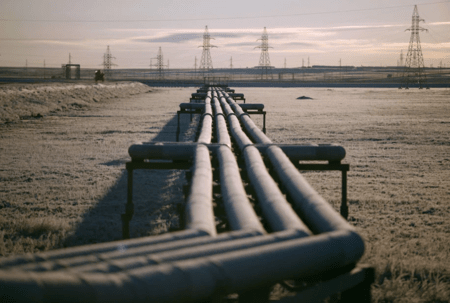
Pipelines run from a gas field on Russia's Yamal Peninsula
Source: Bloomberg News (https://www.washingtonpost.com/world/2022/05/24/eu-russian-gas-putin-rubles/)
Europe is the Kremlin’s primary and major market for natural gas and oil exports, accounting for almost 40%. Last week as the war continued between Ukraine and Russia, the Kremlin cut off supplies to Poland & Bulgaria, followed by Finland, as they refused to trade in the Russian currency- rubles. However, with the economic sanctions imposed on Russia, European countries could not trade and get natural gas from Russia, risking an energy crisis. But, due to the EU’s dependence on Russian gas, they have found a way through these sanctions via technicalities to trade and procure gas in the short term. Owing to these technicalities, the EU will not be conducting direct transactions with the Russian central bank. Instead, it has opened two accounts at Gazprom bank, enabling the EU to say it is paying for natural gas in euros. In contrast, Russia can say it is receiving payment in rubles.
While Putin, with his tactics, is making the European countries scramble, the Russian natural gas stocks are set to be full by summer. Due to Russia’s lack of flexibility in gas storage and infrastructure to divert the gas, the Kremlin’s position is not as strong as Putin is making it to be. The Kremlin is already selling lesser gas to Europe due to the EU and the US deal for natural gas and cuts in supply to Poland, Bulgaria, and Finland. While in the short term, the EU is willing to jump through hoops to avoid a massive energy crisis, Russian oil and gas are a significant source of income for Moscow, and with the EU looking at alternatives, this will affect the Russian economy in the long run.
By Sanjana Gupta - Batch 20-22
EU reveals ‘Green Energy’ Plan to cut Russian fossil fuels
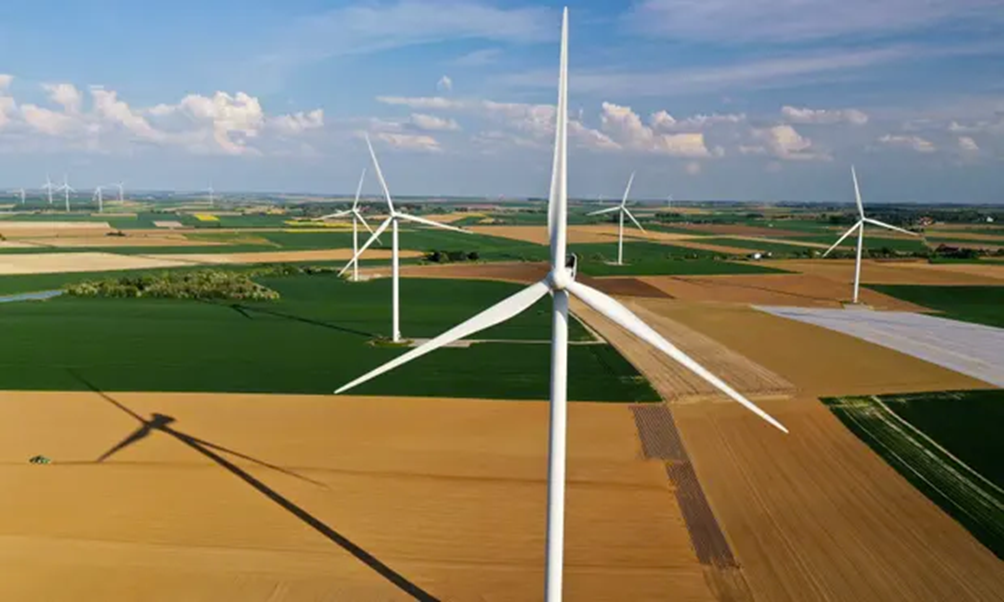
European Union (EU) announces a $316 billion ‘Green Energy’ plan to end dependence on Russian oil and gas in the next five years. This plan is seen as a counter-response to Russia’s invasion of Ukraine and will impact Kremlin’s finances. It will also enhance EU climate policies in the future.
The EU wants to phase out Russian fossil fuels by increasing its solar and wind power enormously through this plan. For this, it requires an additional $220 billion in the coming five years. The approach taken by the EU is called ‘Repower EU,’ which focuses on cutting off Russian fossil fuels by 2027. It will save energy, speed up the Russian oil and gas phase-out, and encourage more fresh investments.
The European Commission President Ursula Von Der Leyen said, “We have raised the target for the share of renewables in 2030 from 40 to 45 percent.” Along with that, several EU officials plan to slash energy consumption by 13 percent by 2030.
Officials have admitted that a shift from Russian fossil fuels means more coal and nuclear gas usage in the short run for the EU. The decision to cut Russian gas has also forced the EU to import LNG from Qatar, the US, and Azerbaijan, which has led to a massive increase in EU spending.
By Nihal Kothavale - Batch 20-22
India set to join the Indo-Pacific Economic Framework for Prosperity (IPEF)
Prime Minister Narendra Modi attended the launch of the Indo-Pacific Economic Framework for Prosperity in Tokyo on 23 May 2022. India’s presence at the launch signals its readiness to join hands with its Quad counterparts, New Zealand, and 7 ASEAN members in creating a new economic framework led by the USA. The IPEF launch involved negotiations pivoted around four main pillars; trade, supply chain resiliency, clean energy and decarbonization, and taxes and anti-corruption measures.
India’s willingness to join the partnership is driven by the motivation to build an inclusive and flexible partnership. PM Modi highlighted the need for trust, transparency, and timeliness in building resilient supply chains and said he was certain that the framework would lead to “prosperity and peace in the Indo-Pacific region”.
The launch of IPEF depicts that the Quad is strengthening its framework and is effectively extending its influence into the Indo-Pacific. Moreover, India’s participation in this framework, after its refusal to join the RCEP, sends a signal that the country is taking a solid stance against China. The IPEF is set to provide reliable alternatives to businesses looking to diverge from China, as highlighted by the US Commerce Secretary.
By Kaira Vartak - Batch 20-22
Sri Lankan scramble for economic revival
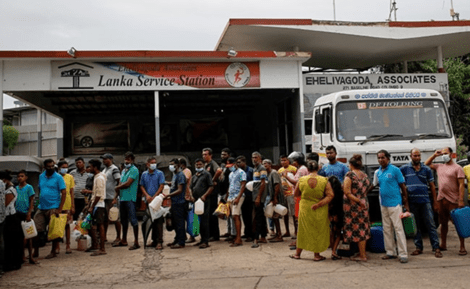
Sri Lankan citizens faced with acute food shortage.
Source: https://www.ndtv.com/world-news/sri-lanka-crisis-economic-promise-to-going-bust-in-10-points-2984771
Sri Lanka is facing its worst economic crisis since independence, with food and fuel shortages, soaring prices, and power cuts affecting a large number of the citizens, resulting in massive protests, which culminated with the resignation of former PM Rajapaksa.
The newly appointed PM Ranil Wickremesinghe told the Parliament that Sri Lanka is one of the nations expected to go without food due to the global food shortage this year. He advocated using unused state land for cultivation as a mitigation measure.
He has appointed Maldivian former President Mohamed Nasheed as the “coordinator” for securing foreign aid to Sri Lanka. While the Sri Lankan PM is in talks with the World Bank and IMF for securing aid, New Delhi, in keeping with India’s Neighbourhood First policy, has extended this year alone support worth over USD 3.5 billion to the people of Sri Lanka. The first consignment comprising 9,000 metric tonnes (MT) of rice, 200 MT of milk powder, 24 MT of life-saving medicines and 40,000 MT of fuel. Japan has also announced to provide USD 1.5 million through the World Food Programme for essential food rations and school meal programmes.
By Rithika Thammaiah C - Batch 20-22
European Union’s Delegates Visit Silicon Valley
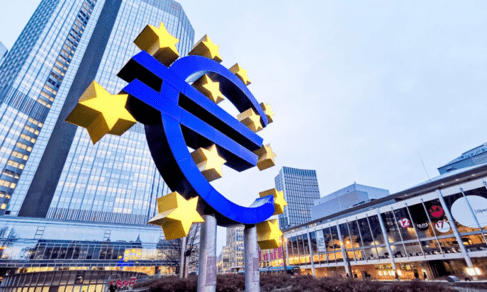
Source: PYMNTS. (2022, May 24). EMEA Daily: EU Meets Big Tech. Retrieved May 27, 2022, from Pymnts.com website:
https://www.pymnts.com/emea/2022/emea-daily-eu-meets-big-tech-gorillas-cuts-jobs/
From 23 May to 27 May, delegates of the European Union in Silicon Valley have undertaken a weeklong stay. Multiple discussions with the big tech companies like Google, Apple, Meta, eBay, PayPal, Airbnb, and Uber, along with other stakeholders like the local authorities and members of academia are conducted. It is led by the Internal Market and Consumer Protection Committee delegation, Mr Andreas Schwab.
The visit highlights EU attempts at understanding tech regulation. It is a key opportunity to gain more insight into USA’s legislative framework on e-commerce and related platforms and aims to strengthen the transatlantic dialogue in the digital realm. It will also focus on digital market advances and contribute to the committee’s ongoing work on the single digital market and consumer protection.
The ongoing work includes the EU’s digital policy agenda, which recently introduced certain rules for online platforms under the purview of the Digital Services Act (DSA) and the Digital Markets Act(DMA). The DSA seeks to make platform companies responsible for the content published on their platforms. The DMA is a new EU law that will impose restrictions on Big tech companies to enhance competition in the digital markets. These rules will make the online environment better for European users.
Furthermore, last month, EU officials revealed that the EU is planning to open an office in San Francisco to engage with Silicon Valley giants, given the increasing scrutiny over some tech giants headquartered there. However, the plans are not definitive yet.
Lastly, the EU’s efforts in its digital transformation aim to benefit the European citizens, build a digital network that works for the people, create an open, democratic and sustainable society, and establish a fair and competitive digital economy.
By Nikita Varghese - Batch 20-22
African food security impacted by the Russo-Ukrainian War
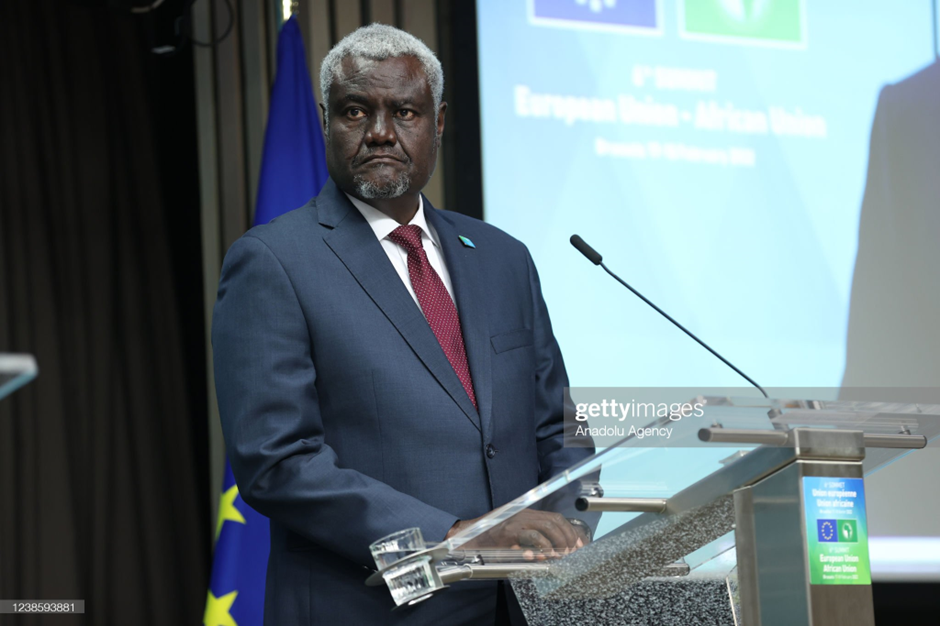
A file photograph of the chairperson of the African Union- Moussa Faki Mahamat.
Photo by Dursun Aydemir/Anadolu Agency via Getty Images)
In an address for Africa Day (May 25), the chairperson of the African Union- Moussa Faki Mahamat, stated that “Africa has become the collateral victim” of the ongoing Russia-Ukraine conflict. The United Nations Secretary-General António Guterres remarked that the conflict is creating a “perfect storm” for the developing countries in Africa.
Africa is already experiencing several crises, including climate change effects and the novel coronavirus pandemic. The latest to adversely affect the continent is soaring inflation and food shortages caused by the conflict between Russia and Ukraine, which account for a third of the world’s wheat and barley production.
Recently at the World Economic Forum, Poland’s Prime Minister Mateusz Morawiecki remarked that Russia’s Vladimir Putin is weaponizing Ukraine’s crops as a “blackmail tool” for the rest of the world. Ursula von der Leyen, the President of the European Commission, also remarked that hunger is being used as a tool by Russia. During a recent visit to Africa, German Chancellor Olaf Scholz stated that Germany would work towards restarting grain exports to Africa from Ukraine.
The Russo-Ukrainian war threatens to place an inordinate burden on Africa and has highlighted the growing need to improve food security in Africa. It is pertinent to note that the theme of this year’s Africa Day is the celebration of indigenous African foods along with their diversity and nutritional value.
By Yasmeen Cheema - Batch 20-22